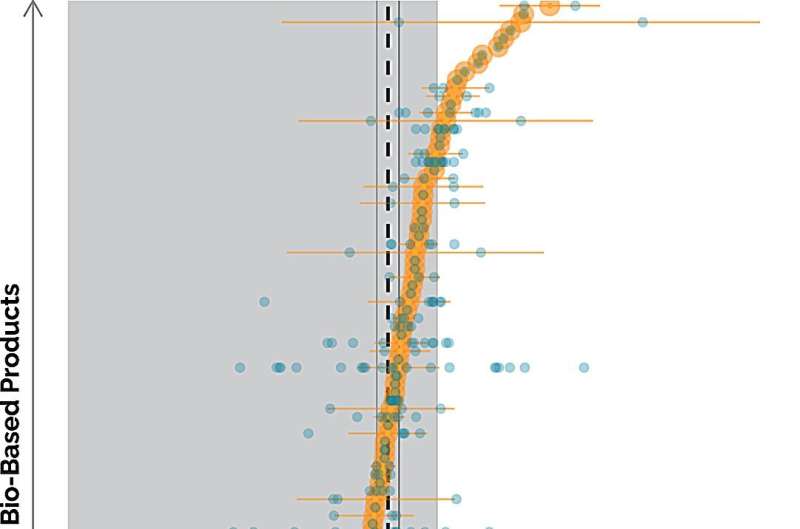This article has been reviewed according to Science X's editorial process and policies. Editors have highlighted the following attributes while ensuring the content's credibility:
fact-checked
peer-reviewed publication
trusted source
proofread
Biomaterials contribute greatly to reduction of greenhouse gas emissions but are not yet climate neutral, finds study

On average, bio-based products emit 45% less greenhouse gas emissions than the fossil materials they replace, according to research conducted by Radboud University, published in Nature Communications. At the same time, there is a large variation between individual bio-based products and more efforts are required to achieve climate neutrality. Additionally, biomaterials may have less favorable environmental impacts in other areas.
Globally, there is a lot of investment in developing new materials from biomass, commonly known as biomaterials, to mitigate CO2 emissions from fossil materials. Biomaterials are derived from plants and are intended to replace materials made from fossil fuels, such as bio-plastics or bio-fibers (for clothing). It is assumed that biomaterials are better in terms of environmental impact.
Research from Radboud University and the Joint Research Center shows that, on average, new biomaterials emit 45% less CO2 than their counterparts made from fossil fuels. The researchers analyzed data from 98 new biomaterials reported in 130 international studies.
"These studies considered the entire chain: from raw material extraction, production itself, to the final waste processing," said Emma Zuiderveen, lead researcher. "This is the first time a large-scale analysis based on such life cycle assessments has been conducted for biomaterials in development."
Climate neutrality
Even though CO2 emissions on the whole decrease, significant differences exist between and among biomaterials, necessitating more action to achieve complete climate neutrality across the entire production chain. Zuiderveen noted, "No material is 100% climate-neutral. Some are close, but others even emit more CO2 than the fossil materials they replace."
Another consideration is that, despite reducing CO2 emissions, the production of biomaterials may still cause other environmental impacts. Zuiderveen explained, "For instance, through the use of fertilizers in the production of biomass used for biomaterials. This can lead to eutrophication: an excess of nutrients resulting in oxygen depletion in surface waters."
The researchers calculated that, on average, the production of biomaterials contributed to an increase in eutrophication impact. "Reducing CO2 emissions is very important in mitigating climate change, however, we should avoid shifting the impact to other areas. Extra attention is therefore needed if we decide to transition to biomaterials on a large scale."
More information: Emma A. R. Zuiderveen et al, The potential of emerging bio-based products to reduce environmental impacts, Nature Communications (2023). DOI: 10.1038/s41467-023-43797-9
Journal information: Nature Communications
Provided by Radboud University





















